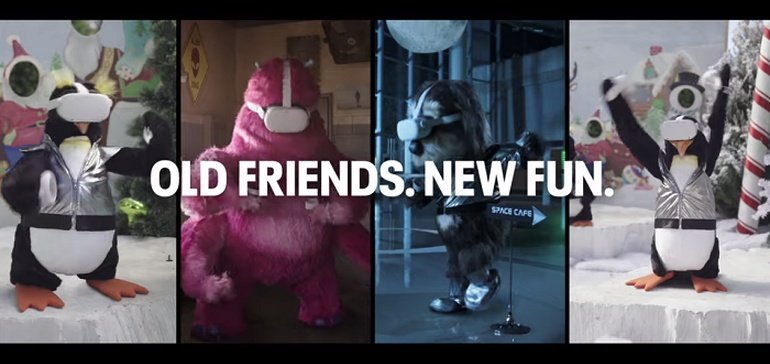Social Media
Meta Launches New Metaverse-Aligned Ad Campaign for its Quest 2 VR Headsets
- By Brett Belau
11 Feb

While Facebook’s daily user count may have stalled, parent company Meta is already looking towards the next stage, by shifting its attention to the theoretical ‘metaverse’ and how we’ll all be interacting in fully digital environments in the very near future.
Which is the focus of Meta’s latest ad campaign, which it launched this week.
As you can see, amid the Super Bowl hype train, Meta’s looking to promote its Quest 2 VR headsets, with the story of an out of work dog mascot who rediscovers his old friends in Meta’s version of the metaverse – which, at least based on this example, will exist within VR.
Which is not the whole metaverse story, as Meta is keen to point out. Indeed, Meta has repeatedly noted that the metaverse, as per its vision, will incorporate AR, VR, machine learning, AI, advancing wearable devices, and more.
Essentially, every evolving tech of any kind will tie back into the metaverse, according to Meta’s growing PR campaign. Which is interesting, because by switching its name to ‘Meta’, and placing that umbrella term over every type of tangentially related tech, Meta actually is taking ownership of the metaverse conversation, to the point that it’s gradually building more association with the term, which doesn’t necessarily mean anything in a broader sense.
I mean, a ‘metaverse’ can be many things, but it’s now coming to be known as this new, all-encompassing digital connection space. But AR will work independently of any metaverse, as will AI functions, so it’s interesting to see how Meta is re-shaping the broader narrative, which will ultimately place it in the driver seat in pushing the next stage of tech innovation.
Which, of course, will include its VR headsets. And while sales of the Quest 2 are rising (Meta’s Reality Labs division brought in $877 million in revenue last quarter, $160 million more than its previous best quarterly mark), there is still a way to go before we end up like this dog here, all hanging out with friends in this immersive world, full of limitless opportunities.
But it does seem like that is the way we’re headed. It’s just not clear, from all the various fragmented parts that Meta’s trying to pull together, how we’ll get there exactly.
Really, Meta’s vision of the metaverse, as it’s shown in various video clips and presentations, is just its VR world, which it’s looking to develop into a social alternative via Horizon Worlds and other platforms.
Which looks impressive (if you really like The Lego Movie and don’t mind floating around like the genie from Aladdin), but it’s still some way off being a fully interactive, immersive space.
And it doesn’t necessarily require linkage to AR tools or other functions, it’s just VR, which Meta has been developing for years, under a different name.
Of course, that will eventually facilitate other opportunities, like trading digital items and shopping in VR spaces. All of these elements will collide, making a broader ‘metaverse’ experience. But I can tell you from experience, spending all day in VR is currently not the most enticing prospect, and it will take some time and adjustment to facilitate more intuitive controls that don’t leave you feeling queasy and stunted in the space.
But there is huge potential there, and huge value in the next shift. It’s just interesting to see how Meta’s trying to dominate a range of broader tech conversations and developments by putting them all under one ‘metaverse’ banner, while also innocently claiming that ‘no one company will run the metaverse’.
Because it’s quite possible that one company will run this version of the metaverse, and establish the rules for all others that wish to take part. That company is Meta, formerly Facebook, which is gradually shaping the next stage of digital interaction.
Source: www.socialmediatoday.com, originally published on 2022-02-10 18:08:31
Connect with B2 Web Studios
Get B2 news, tips and the latest trends on web, mobile and digital marketing
- Appleton/Green Bay (HQ): (920) 358-0305
- Las Vegas, NV (Satellite): (702) 659-7809
- Email Us: [email protected]

© Copyright 2002 – 2022 B2 Web Studios, a division of B2 Computing LLC. All rights reserved. All logos trademarks of their respective owners. Privacy Policy

![How to Successfully Use Social Media: A Small Business Guide for Beginners [Infographic]](https://b2webstudios.com/storage/2023/02/How-to-Successfully-Use-Social-Media-A-Small-Business-Guide-85x70.jpg)



![How to Successfully Use Social Media: A Small Business Guide for Beginners [Infographic]](https://b2webstudios.com/storage/2023/02/How-to-Successfully-Use-Social-Media-A-Small-Business-Guide-300x169.jpg)


Recent Comments